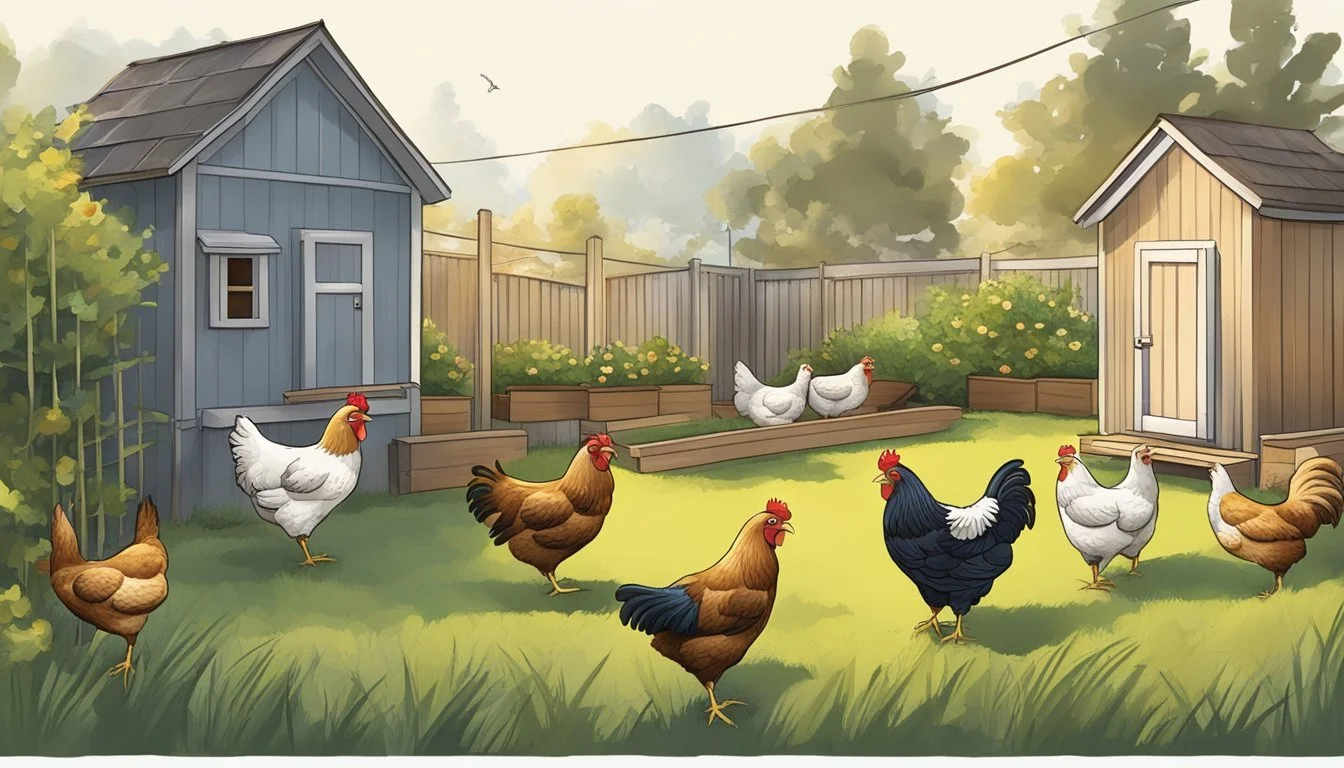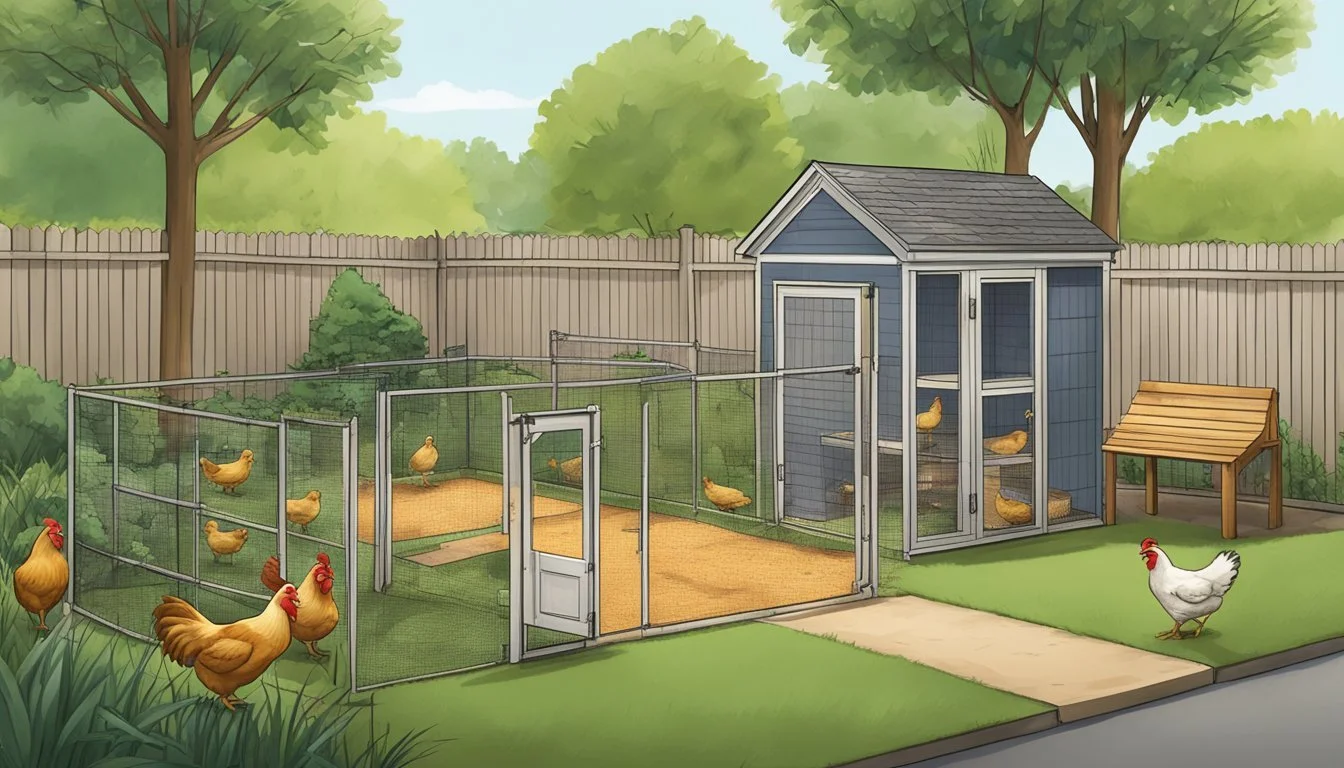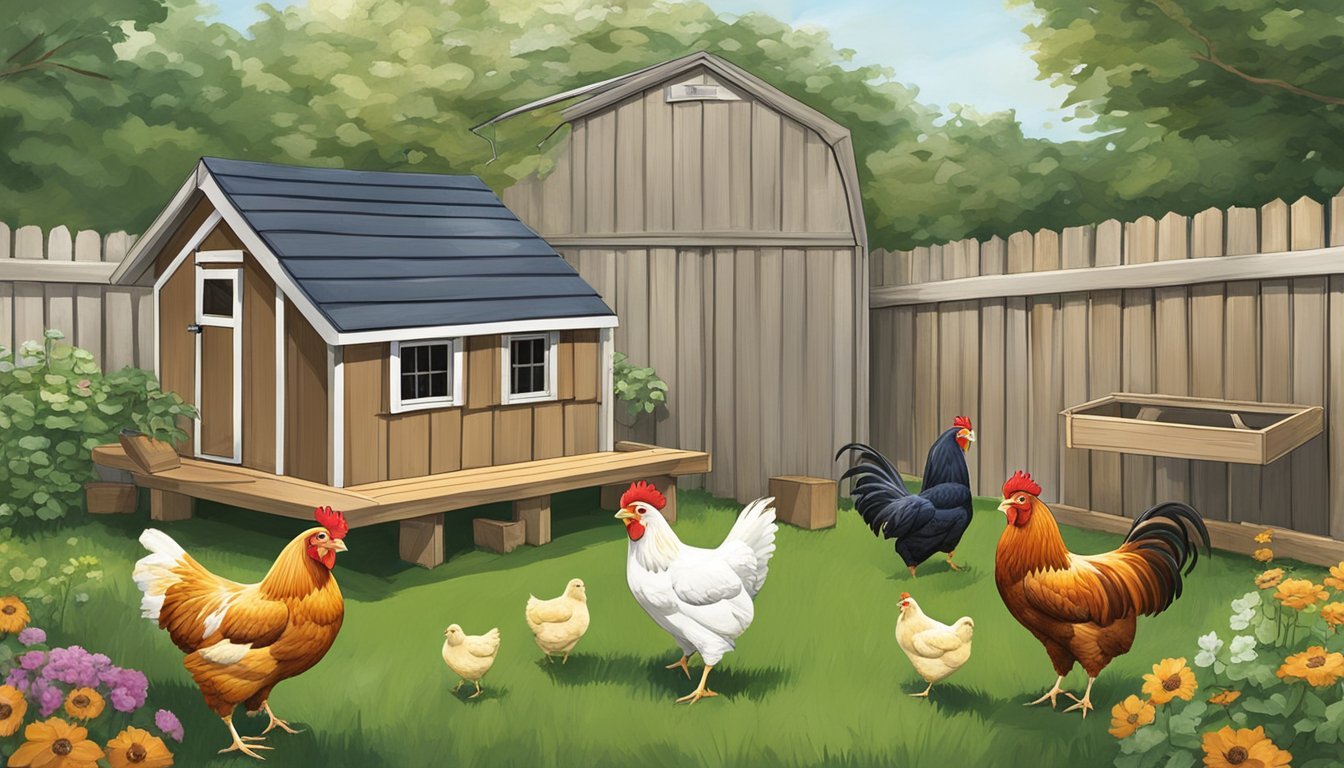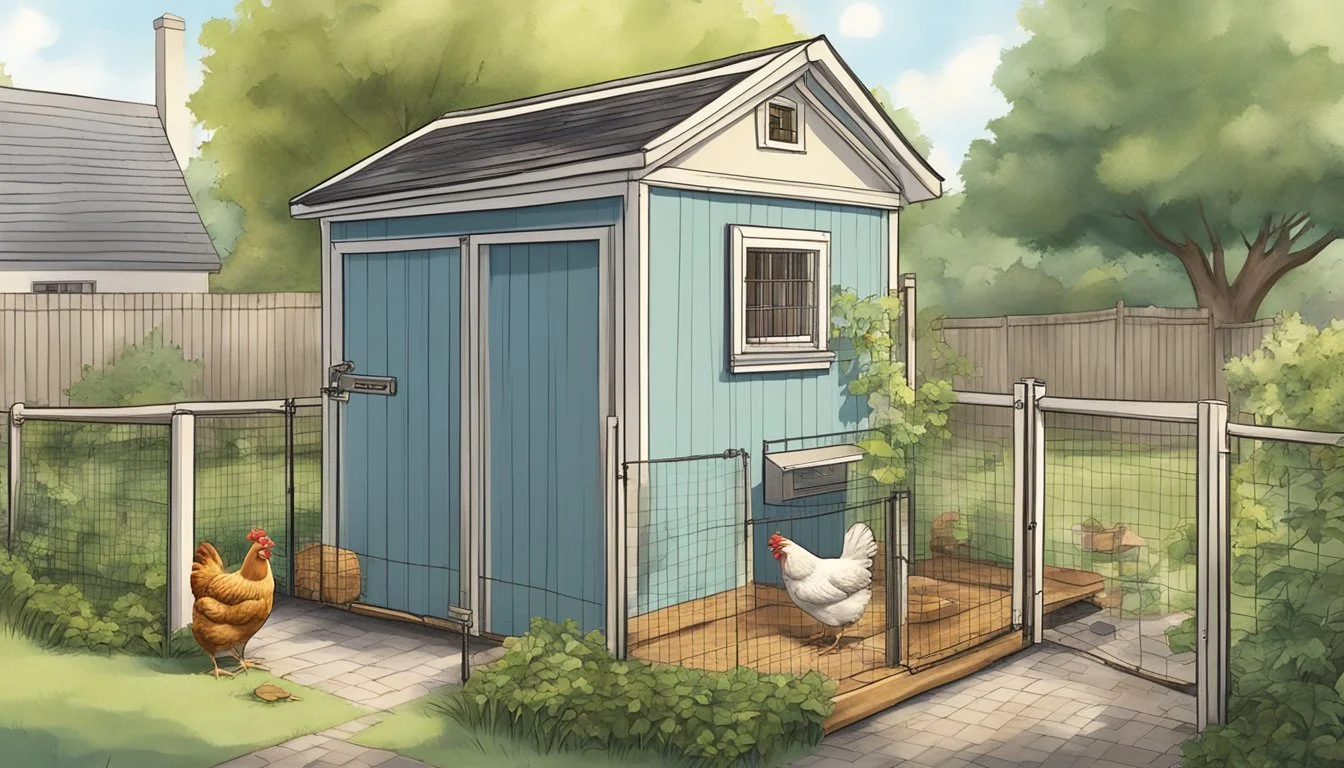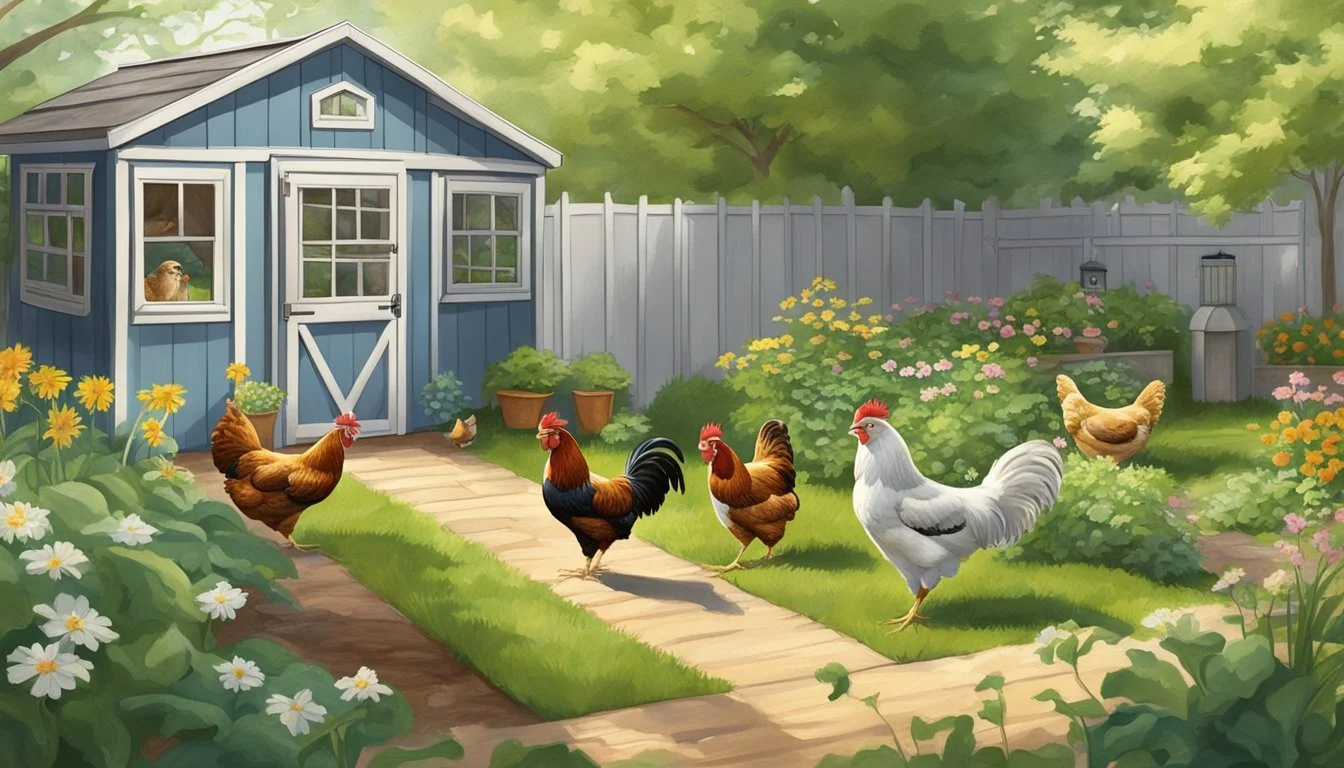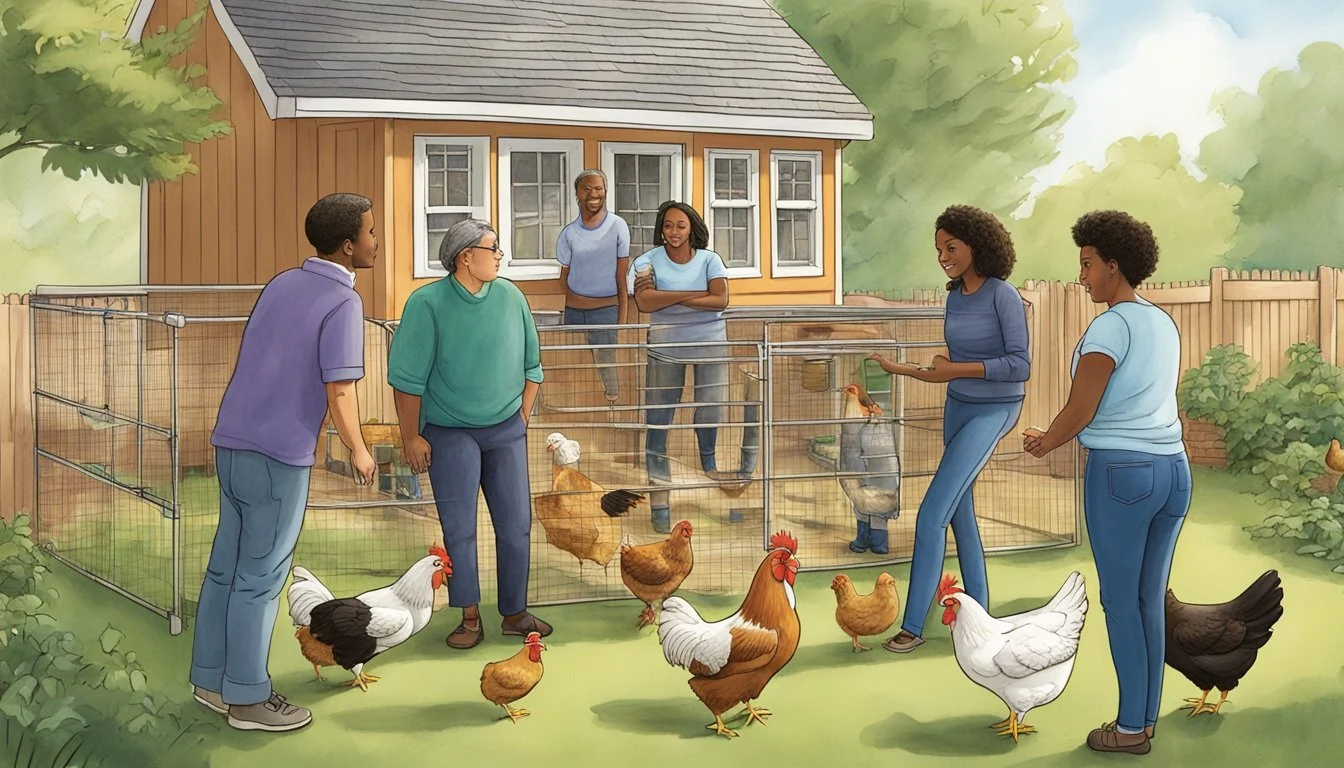Keeping Backyard Chickens in Cambridge, MA
A Practical Guide to Urban Poultry Farming
The practice of keeping backyard chickens in Cambridge, Massachusetts, has been a topic of local discussion and regulatory consideration. In Cambridge, there has been a trend toward urban agriculture, and chickens are central to this movement. Residents interested in sustainable living and fresh eggs have been drawn to the idea of raising chickens within their backyards. However, local laws and regulations have been less clear on the legality of such practices, causing residents to navigate a mix of bylaws and enforcement policies that can vary.
Historically, keeping backyard chickens in Cambridge has been officially prohibited, yet this has not deterred all city dwellers from maintaining their coops. Many residents have taken the approach of ensuring that their chicken-keeping is unobtrusive to neighbors, which tends to minimize issues. Despite the lack of formal protections, the community of backyard chicken enthusiasts has been growing. This has led to calls for clear legal language that would allow for the keeping of chickens within city limits without fear of reprisal.
Changes have been progressing as city officials and residents work together to find a balance between the desires of would-be chicken keepers and the regulations needed to maintain community standards. Plans to legally sanction the keeping of backyard chickens have been under consideration, and the topic has been reviewed by the Cambridge Planning Board. The city is actively moving towards resolutions that would provide a framework for keeping chickens, which indicates an evolving perspective on urban agriculture in Cambridge, reflecting a broader trend of integrating more sustainable practices in urban environments.
Understanding Cambridge's Zoning Ordinances
In Cambridge, MA, the zoning ordinances determine where and how residents can keep backyard chickens. These rules are designed to ensure public health and harmony within residential areas.
Zoning Basics for Backyard Chickens
The City of Cambridge's zoning regulations play a crucial role in guiding residents on where they can legally keep backyard chickens. Zoning districts are demarcated to separate residential, commercial, and industrial areas, and specific rules apply within each designated zone. Residents must be aware of their property's zoning classification to understand the baseline rules for hen-keeping.
Specific Restrictions on Livestock and Hen-Keeping
Cambridge local government has laid out clear restrictions regarding the keeping of livestock, which includes poultry such as chickens. These restrictions typically cover:
Number of chickens allowed: Usually based on the size of the property.
Distance from neighboring homes: There are set limits on how close coops can be to adjacent dwellings to minimize nuisances.
Coop specifications: Requirements that ensure cleanliness, security, and adequate space for the chickens' welfare.
Permitting Process for Backyard Chickens
To maintain backyard chickens within Cambridge, residents must go through the permitting process. This process involves:
Application submission: Residents should submit an application to the relevant city department.
Notice to neighbors: Neighbors may need to be informed of the intent to keep chickens, often with the opportunity to comment.
Inspection: The property may be subject to an inspection to confirm adherence to the zoning and health regulations.
Approval or Denial: The local government will issue a permit to keep backyard chickens if all requirements are met.
Setting Up Chicken Coops
When considering the addition of chickens to a backyard in Cambridge, MA, owners must prioritize coop location and adhere to specific construction and maintenance regulations to ensure a clean, safe, and legal environment for their poultry.
Selecting a Suitable Location
A proper location for a chicken coop is vital to the well-being of the chickens and the compliance with local ordinances. Homeowners should seek a site that:
Is well-drained to prevent water accumulation and ensure cleanliness.
Provides adequate sunlight and shade to maintain a healthy living space for the chickens.
Is situated away from property lines to comply with any local setback requirements.
Coop Construction and Maintenance Regulations
In Cambridge, the construction and upkeep of chicken coops are subject to regulations that maintain health and safety standards:
Coops must be built sturdy and secure from predators.
They should have sufficient ventilation and be kept clean to prevent the spread of disease.
Regular maintenance is necessary to avoid attracting vermin and to keep the structure in good condition.
It is necessary to check with Cambridge authorities for any recent changes to regulations or requirements for permits and inspections.
By carefully selecting a location and adhering to city rules, homeowners can create a suitable and legal environment for raising backyard chickens.
Animal Welfare and Neighbor Considerations
When keeping backyard chickens in Cambridge, MA, owners must adhere to health and safety regulations and maintain harmonious relationships with their neighbors. This balance ensures the wellbeing of the chickens and the local community.
Health and Safety Requirements
The City of Cambridge mandates specific health and safety standards to safeguard both animals and humans. The relevant health department oversees these regulations, which include:
Shelter: Adequate and clean hen houses to protect chickens from the elements.
Space: Sufficient space per chicken to prevent overcrowding and ensure good health.
Sanitation: Regular cleaning schedules to prevent odors and pests.
Compliance with these requirements helps mitigate any potential health risks associated with keeping backyard chickens.
Avoiding Conflicts with Neighbors
Maintaining positive relations with neighbors is crucial for backyard chicken keepers. Strategies to avoid conflicts include:
Communication: Engaging in open dialogues with neighbors about chicken-keeping plans.
Boundary Respect: Ensuring chicken enclosures do not encroach on neighboring properties.
Noise Management: Keeping noise levels low, particularly in the early morning.
By considering neighbors' concerns and taking preemptive steps, chicken owners can foster a supportive environment within the community.
Legal Aspects of Keeping Chickens
Maintaining backyard chickens in Cambridge, Massachusetts, involves understanding specific local ordinances and regulations. Residents must comply with these rules to avoid legal repercussions, such as fines or the removal of their chickens.
Navigating Local Chicken Laws
Cambridge residents who wish to keep chickens must abide by city-specific ordinances. The law stipulates requirements for permits, coop construction, and the distance the coop must be from property lines. Before acquiring chickens, individuals should consult the Poultry regulations by town as provided by NOFA/Mass, ensuring they meet all criteria, including restrictions on the number of chickens and the allowance of roosters.
Handling Violations and Fines
If a resident violates local chicken laws, they may be subject to fines or other penalties. It's crucial to respond promptly to any notices of violation and take corrective action. For example, noncompliant coop placement or exceeding the permitted number of chickens could result in enforcement measures. Residents should stay informed on the fines associated with each type of ordinance breach.
Consulting with a Lawyer
Should residents face legal complications regarding backyard chickens, consulting with a lawyer specializing in local ordinances or animal law is advisable. They can provide guidance on navigating the legal landscape, any potential legal fees, and the process for contesting fines. Legal counsel can also help in understanding the evolving landscape of laws aimed to legalize backyard chicken-keeping, a movement that is gaining traction in cities like Cambridge.
Benefits of Backyard Chickens
Keeping backyard chickens in Cambridge, Massachusetts has distinct advantages, particularly in the realms of egg production and positive environmental impacts.
Egg Production
Backyard chickens are known for their ability to produce fresh eggs. An average hen can lay approximately 250 to 300 eggs per year, depending on the breed. Owners can expect a steady supply of eggs for most of the year.
Contribution to Local Ecology
Chickens contribute significantly to local ecology in several ways. They naturally help control pests by consuming insects, including mosquito larvae, which can decrease the reliance on chemical repellents. Moreover, the waste produced by chickens acts as a high-quality fertilizer that enriches soil health and can boost the growth of various crops.
Complementary Practices
Integrating backyard chicken keeping with other sustainable hobbies can enhance productivity and contribute positively to the environment.
Combining Chicken Keeping with Beekeeping
Keeping bees alongside chickens can be a complementary practice, as each serves beneficial roles in a backyard ecosystem. Bees are excellent pollinators, significantly boosting the productivity of fruit and vegetable gardens. Their presence increases biodiversity and helps maintain the health of flowering plants.
On the other hand, chickens contribute by providing natural pest control. They consume insects that could otherwise harm garden plants or bother bee populations. It’s important to maintain a balance and ensure chickens do not disturb the bee hives. The synergy between beekeeping and chicken keeping can foster a more self-sustaining environment, allowing gardeners and hobbyists to maximize the use of their space while promoting ecological health.
Community Engagement and Education
This section addresses how Cambridge engages with neighboring communities and educates residents on the practice and benefits of keeping backyard chickens. It delves into collaborative efforts, available learning opportunities, and the active promotion of urban poultry farming.
Joining Forces with Neighboring Areas
Cambridge is not alone in its urban agriculture endeavors; nearby Somerville and Boston are also exploring or have policies regarding backyard chickens. By aligning with these neighbors, Cambridge can foster a regional network of urban poultry enthusiasts. This collaboration aims to ensure that the residents adhere to best practices and legal guidelines while maintaining the welfare of the chickens and the community.
Educational Resources and Local Workshops
The community provides a variety of educational resources and local workshops aimed at both existing and prospective chicken keepers. These sessions cover essential topics such as:
Legal Requirements: Understanding Cambridge's policies on backyard poultry.
Chicken Care: Best practices for feeding, housing, and healthcare.
Sustainability: Methods to integrate chickens into eco-friendly gardening and composting.
Local organizations and agricultural extensions serve as valuable resources, providing expertise and support for residents to maintain healthy and productive flocks.
Advocacy for Backyard Chickens
Residents, equipped with knowledge from workshops and resources, become advocates for the cause, encouraging the city to recognize the benefits of allowing backyard chickens. Advocacy groups focus on the chickens' role in pest control, waste reduction through composting, and the production of fresh eggs. They promote responsible chicken-keeping as a sustainable food source, appealing to both residential and commercial districts within Cambridge.

